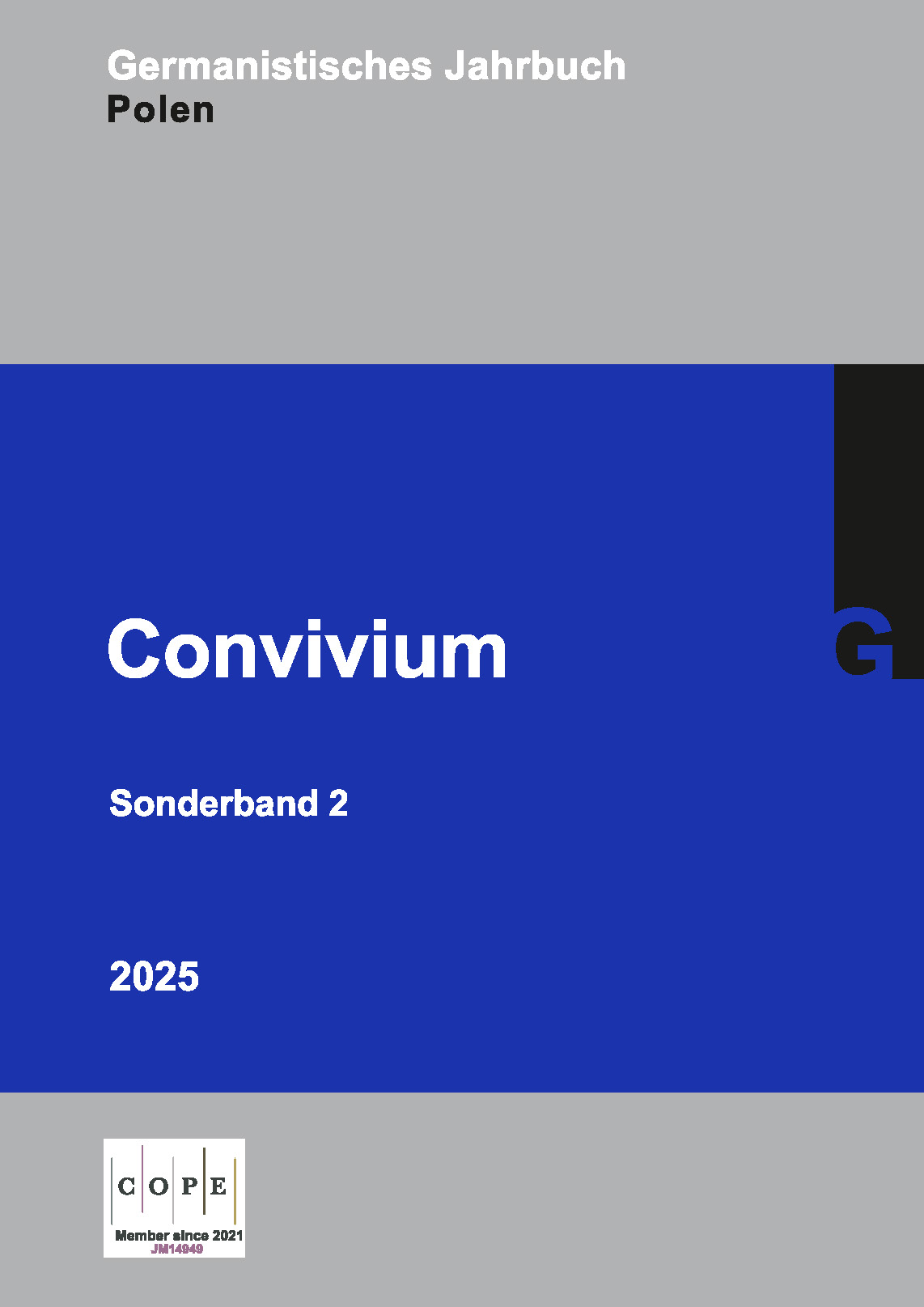Przestrzenie relacyjności i czasowości w Stern 111 LUTZA SEILERA
DOI:
https://doi.org/10.18778/2196-8403.S2.07Słowa kluczowe:
relacyjność, tymczasowość, utopia, neoliberalizm, transformacja ustrojowa, Berlin, LUTZ SEILERAbstrakt
Powieść Stern 111 (2020) LUTZA SEILERA śledzi różne doświadczenia małżeństwa z Gery w Turyngii i ich dorosłego syna, Carla, w okresie szesnastu miesięcy bezpośrednio po upadku muru berlińskiego. Społeczne wzorce systemu kapitalistycznego są krytykowane na przykładzie rodziców, którzy wyjeżdżają na Zachód. Z drugiej strony syn doświadcza alternatywnego modelu społecznego, gdy dołącza do sceny skwaterów w dzielnicy Berlin-Mitte. Chociaż struktury relacji społecznych (konwiwialistycznych) wkrótce się rozpadają, ta porażka prowadzi do rozwoju Carla, który uświadamia sobie własną pozycję wśród innych ludzi. Można to podsumować jako ‚poetykę porażki’, ponieważ niepowodzenie modelu społecznego tworzy tymczasowość, w której mogą pojawić się nowe dynamiki i sieci relacji. Czas estetyczny wyłania się jako przestrzeń wolności, która pozwala wyobrazić sobie dalsze możliwości wspólnego życia.
Bibliografia
Berlant, Lauren (2011): Cruel Optimism. Durham.
Google Scholar
DOI: https://doi.org/10.1515/9780822394716
Böttiger, Helmut (2023): Lutz Seiler. Eine Ausnahmeerscheinung in der Gegenwartsliteratur. In: DLF Kultur, 19.07.2023: https://www.deutschlandfunkkultur.de/lutz-seiler-georg-buechner-preis-100.html (10.11.2024).
Google Scholar
Braidotti, Rosi (2019): Posthuman Knowledge. Cambridge.
Google Scholar
Crossley, Nick (2020): Relations-in-Process: In Honour of François Dépelteau. In: Digithum 26:1-14: https://www.raco.cat/index.php/Digithum/article/view/n26-crossley (10.11.2024).
Google Scholar
DOI: https://doi.org/10.7238/d.v0i26.374139
Dépelteau, François (2018): The Palgrave Handbook of Relational Sociology. Basingstoke.
Google Scholar
DOI: https://doi.org/10.1007/978-3-319-66005-9
Die konvivialistische Internationale (2020): Das zweite Konvivialistische Manifest: Für eine post-liberale Welt. Aus dem Französischen von Michael Halfbrodt. Bielefeld.
Google Scholar
Egger, Sabine (2024): Relationality and Lateral Agency in Herta Müller’s Reisende auf einem Bein and Lutz Seiler’s Stern 111. In: Oxford German Studies 53/3:315-330.
Google Scholar
DOI: https://doi.org/10.1080/00787191.2024.2395197
Ette, Ottmar (2022): Was heißt und zu welchem Ende studiert man romanische Literaturwissenschaft. Berlin.
Google Scholar
DOI: https://doi.org/10.1515/9783110788419
Fuchs, Anne (2019): Precarious Times. Temporality and History in Modern German Culture. Ithaka.
Google Scholar
DOI: https://doi.org/10.7591/cornell/9781501735103.001.0001
Hähnel-Mesnard, Carola (2022): Zeiterfahrung und gesellschaftlicher Umbruch in Fiktionen der Post-DDR-Literatur. Literarische Figurationen von Zeitwahrnehmung im Werk von Lutz Seiler, Julia Schoch und Jenny Erpenbeck. Göttingen.
Google Scholar
DOI: https://doi.org/10.14220/9783737013451
Ingold, Felix Philipp / Sánchez, Yvette (eds.) (2008): Fehler im System. Irrtum, Defizit und Katastrophe als Faktoren kultureller Produktivität. Göttingen.
Google Scholar
Iztueta-Goizueta, Garbiñe (2022): Wende als Experimentierfeld: kritisch-posthumanistische und utopisch-dystopische Perspektiven auf Heimat in Lutz Seilers Stern 111. In: Aussiger Beiträge 16:47-61.
Google Scholar
DOI: https://doi.org/10.21062/ab.2022.003
Kasaty, Olga Olivia (2007): Ein Gespräch mit Lutz Seiler. In: Dies.: Entgrenzungen. Vierzehn Autorengespräche über Liebe, Leben und Literatur. München.
Google Scholar
Latour, Bruno (2010): Das Parlament der Dinge. Für eine politische Ökologie. Aus dem Französischen von Gustav Roßler. Frankfurt a.M.
Google Scholar
Mau, Steffen (2020): Roman ‚Stern 111‘ von Lutz Seiler: DDR-Transistor gewinnt Leipziger Buchpreis. In: Der Freitag, 12.03.2020: https://www.freitag.de/autoren/steffen-mau/ddr-tranistor-gewinnt-leipziger-buchpreis (10.11.2024).
Google Scholar
Nowotny, Helga (1993): Eigenzeit. Entstehung und Strukturierung eines Zeitgefühls. Berlin.
Google Scholar
Rosa, Hartmut (2016): Resonanz. Eine Soziologie der Weltbeziehung. Berlin.
Google Scholar
Schröder, Christoph (2020): Lutz Seiler: „Stern 111“. Existentielle Veränderungen und Hoffnungen. In: DLF Kultur, 22.03.2020: https://www.deutschlandfunk.de/lutz-seiler-stern-111-existentielle-veraenderungen-und-100.html (10.11.2024).
Google Scholar
Seiler, Lutz (2004): Sonntags dachte ich an Gott. Aufsätze. Frankfurt a.M.
Google Scholar
Seiler, Lutz (2009): Die Zeitwaage. Erzählungen. Frankfurt a.M.
Google Scholar
Seiler, Lutz (2014): Kruso. Roman. Berlin.
Google Scholar
Seiler, Lutz (2020): Stern 111. Roman. Berlin.
Google Scholar
Pobrania
Opublikowane
Jak cytować
Numer
Dział
Licencja

Utwór dostępny jest na licencji Creative Commons Uznanie autorstwa – Użycie niekomercyjne – Bez utworów zależnych 4.0 Międzynarodowe.










